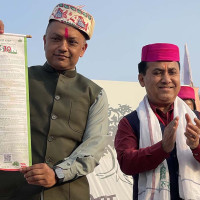- Thursday, 19 February 2026
End Downsides Of Parliamentary Hearing
Governments appoint ambassadors to different countries to represent the country, promote national interests, and strengthen relations and cooperation. This has been in practice right from the time when the concept of the state started and continued to evolve with time. In ancient times, there used to be a practice of sending an envoy to other countries for specific tasks that included conveying messages, negotiation, exchanging gifts, and also for matrimonial purposes. The envoy would return after completing the specific tasks. But the practice of having a residential ambassador abroad was not in vogue till the 15th century.
In Treta Yuga or Ramayana period, which is believed to be approximately between 8th and 4th BCE, Lord Rama, the crown prince of Ayodhya kingdom, sent Hanuman as an envoy to the kingdom of Ravana (presently Sri Lanka) for peace talks. During the Mahabharat period, too, Lord Krishna went to the court of Dhritarastra or Kauravas as a peace envoy of the Pandavas to prevent a possible war between the cousins. This implies that diplomatic practice as a peace mission prevailed in South Asia even in the prehistoric period. Similarly, the practice of sending envoys to foreign countries with specific tasks also existed in Mesopotamia, Egypt, China, Greece and Rome in the ancient and Middle Ages.
Modern diplomacy
The concept of modern diplomacy began during the Renaissance period in Europe. The Republic of Venice, for the first time in history, sent a permanent ambassador to the Papal States (the Vatican City) in 1455. The Peace of Westphalia in 1648 was a milestone in the diplomatic history of the world as it not only ended the 30 years’ War in Europe but also established the concept of sovereignty of states and also formal diplomacy among the nations. The Vienna Convention in 1969 added a new and modern dimension to the field of diplomacy. The Vienna Convention set forth certain obligations, immunities and privileges for ambassadors which guide diplomatic conduct. Nepal became a signatory to the Vienna Convention in the same year or 1969.
Now, all countries have embassies or diplomatic missions in different countries. Nepal has altogether 34 diplomatic missions in 33 countries abroad, apart from several consulates. Embassies are established in different countries considering the level engagement and resources. The resident ambassadors in different countries are concurrently accredited to countries where physical embassies are not in existence. In total, 34 resident ambassadors diplomatically represent all the countries with which Nepal has established diplomatic relations.
The ambassadors are symbols of national prestige and key personnel to conduct diplomacy and foreign policy. They have to undergo different levels of scrutiny before they are formally appointed as ambassadors. Parliamentary hearing is one of the key and mandatory processes in some countries for the people nominated as ambassadors before they are formally given the charge. The parliamentary hearing is to ensure that the best, most suitable, qualified and competent persons get the ambassadorial position.
The parliamentary hearing system was first introduced in the United States in the latter half of the 18th century. The US Constitution has a mandatory provision of a parliamentary hearing and the Senate’s (Upper House of the US parliament) confirmation for newly nominated ambassadors for their appointment. In certain cases, the Senate Foreign Relations Committee can reject the ambassadorial nominees. A few other countries (less than a dozen) have the provision of a parliamentary hearing for ambassadors but not all countries have the mandatory endorsement. Nepal's new constitution has a provision for a parliamentary hearing for ambassadors and other key officials.
Once the government nominates ambassadors and writes to the parliamentary hearing committee, the latter issues a public notice, seeking complaints against the nominees. This is good practice to ensure greater transparency. However, there is a lacuna in it as well. Anyone can register complaints against anyone, regardless of the truth and these complaints are made public through the media. This practice, in some cases, has drawbacks as well. If the complaints are genuine and based on facts and proof, such complaints are positive. However, in some cases, this practice has damaged the public image of the prospective candidates. How can a diplomat function well with such a tarnished image? Thus, the complaints seeking system needs to change, for which a greater debate is necessary for its improvement.
The ambassadorial nominees are asked to present their action plan during the hearing. But in principle, ambassadors cannot have their separate action plans because ambassadors function as per the government’s policy and instructions. Moreover, the ambassadorial nominees prepare action without the knowledge and information of the ground reality. As a result, such action plans may not be realistic and may be difficult to execute in practice. Moreover, some ambassadorial nominees make tall claims which cannot be translated into action.
Experts’ advice
Once approved, the ambassadors and other officials are not directly answerable to the parliamentary hearing committee. This makes the parliamentary hearing process a mere formality and ritualistic. Against this backdrop, the parliamentary hearing committee requires to have the provision of a mid-term review on the action plans presented by the ambassadors. Moreover, the parliamentary hearing has not been effective as per the objective in the absence of necessary expertise on the part of the parliamentary hearing committee members. It would be good if the parliamentary hearing committee seeks experts’ advice on the issues of bilateral relations and issues, so that the parliamentary hearing could be more qualitative.
Parliamentary hearing is a good practice as parliament gets involved in the country’s diplomacy through this process. The function, mandate and decision of the parliamentary hearing committee, so far, do not appear to be in commensurate with parliamentary supremacy. It, in a way, appears to be a shadow of the executive, as it just approves the nomination of the executive. The committee can reject any candidate only by a two-thirds majority. Unless there is a two-thirds majority against, it is considered an endorsement. The decision is made not based on merit, competence and integrity but based on partisan leaning. These are some of the shortcomings of the parliamentary hearing, which need to be addressed to make this more qualitative.
(The author is a former chief editor of this daily and a former ambassador. lamsalyubanath@gmail.com)



-original-thumb.jpg)











